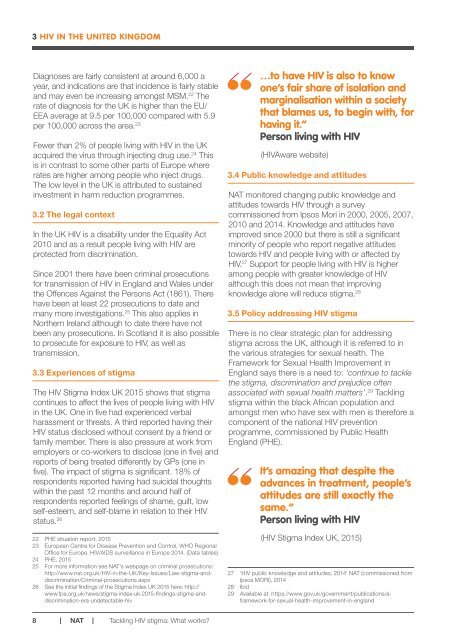Tackling HIV Stigma What works?
Jun_16_Tackling_HIV_Stigma
Jun_16_Tackling_HIV_Stigma
You also want an ePaper? Increase the reach of your titles
YUMPU automatically turns print PDFs into web optimized ePapers that Google loves.
3 <strong>HIV</strong> IN THE UNITED KINGDOM<br />
Diagnoses are fairly consistent at around 6,000 a<br />
year, and indications are that incidence is fairly stable<br />
and may even be increasing amongst MSM. 22 The<br />
rate of diagnosis for the UK is higher than the EU/<br />
EEA average at 9.5 per 100,000 compared with 5.9<br />
per 100,000 across the area. 23<br />
Fewer than 2% of people living with <strong>HIV</strong> in the UK<br />
acquired the virus through injecting drug use. 24 This<br />
is in contrast to some other parts of Europe where<br />
rates are higher among people who inject drugs.<br />
The low level in the UK is attributed to sustained<br />
investment in harm reduction programmes.<br />
3.2 The legal context<br />
In the UK <strong>HIV</strong> is a disability under the Equality Act<br />
2010 and as a result people living with <strong>HIV</strong> are<br />
protected from discrimination.<br />
Since 2001 there have been criminal prosecutions<br />
for transmission of <strong>HIV</strong> in England and Wales under<br />
the Offences Against the Persons Act (1861). There<br />
have been at least 22 prosecutions to date and<br />
many more investigations. 25 This also applies in<br />
Northern Ireland although to date there have not<br />
been any prosecutions. In Scotland it is also possible<br />
to prosecute for exposure to <strong>HIV</strong>, as well as<br />
transmission.<br />
3.3 Experiences of stigma<br />
The <strong>HIV</strong> <strong>Stigma</strong> Index UK 2015 shows that stigma<br />
continues to affect the lives of people living with <strong>HIV</strong><br />
in the UK. One in five had experienced verbal<br />
harassment or threats. A third reported having their<br />
<strong>HIV</strong> status disclosed without consent by a friend or<br />
family member. There is also pressure at work from<br />
employers or co-workers to disclose (one in five) and<br />
reports of being treated differently by GPs (one in<br />
five). The impact of stigma is significant. 18% of<br />
respondents reported having had suicidal thoughts<br />
within the past 12 months and around half of<br />
respondents reported feelings of shame, guilt, low<br />
self-esteem, and self-blame in relation to their <strong>HIV</strong><br />
status. 26<br />
22 PHE situation report, 2015<br />
23 European Centre for Disease Prevention and Control, WHO Regional<br />
Office for Europe. <strong>HIV</strong>/AIDS surveillance in Europe 2014. (Data tables)<br />
24 PHE, 2015<br />
25 For more information see NAT’s webpage on criminal prosecutions:<br />
http://www.nat.org.uk/<strong>HIV</strong>-in-the-UK/Key-Issues/Law-stigma-anddiscrimination/Criminal-prosecutions.aspx<br />
26 See the initial findings of the <strong>Stigma</strong> Index UK 2015 here: http://<br />
www.fpa.org.uk/news/stigma-index-uk-2015-findings-stigma-anddiscrimination-era-undetectable-hiv<br />
…to have <strong>HIV</strong> is also to know<br />
one’s fair share of isolation and<br />
marginalisation within a society<br />
that blames us, to begin with, for<br />
having it.”<br />
Person living with <strong>HIV</strong><br />
(<strong>HIV</strong>Aware website)<br />
3.4 Public knowledge and attitudes<br />
NAT monitored changing public knowledge and<br />
attitudes towards <strong>HIV</strong> through a survey<br />
commissioned from Ipsos Mori in 2000, 2005, 2007,<br />
2010 and 2014. Knowledge and attitudes have<br />
improved since 2000 but there is still a significant<br />
minority of people who report negative attitudes<br />
towards <strong>HIV</strong> and people living with or affected by<br />
<strong>HIV</strong>. 27 Support for people living with <strong>HIV</strong> is higher<br />
among people with greater knowledge of <strong>HIV</strong><br />
although this does not mean that improving<br />
knowledge alone will reduce stigma. 28<br />
3.5 Policy addressing <strong>HIV</strong> stigma<br />
There is no clear strategic plan for addressing<br />
stigma across the UK, although it is referred to in<br />
the various strategies for sexual health. The<br />
Framework for Sexual Health Improvement in<br />
England says there is a need to: ‘continue to tackle<br />
the stigma, discrimination and prejudice often<br />
associated with sexual health matters’. 29 <strong>Tackling</strong><br />
stigma within the black African population and<br />
amongst men who have sex with men is therefore a<br />
component of the national <strong>HIV</strong> prevention<br />
programme, commissioned by Public Health<br />
England (PHE).<br />
It’s amazing that despite the<br />
advances in treatment, people’s<br />
attitudes are still exactly the<br />
same.”<br />
Person living with <strong>HIV</strong><br />
(<strong>HIV</strong> <strong>Stigma</strong> Index UK, 2015)<br />
27 ‘<strong>HIV</strong> public knowledge and attitudes, 2014’ NAT (commissioned from<br />
Ipsos MORI), 2014<br />
28 Ibid<br />
29 Available at: https://www.gov.uk/government/publications/aframework-for-sexual-health-improvement-in-england<br />
8 NAT<br />
<strong>Tackling</strong> <strong>HIV</strong> stigma: <strong>What</strong> <strong>works</strong>?


